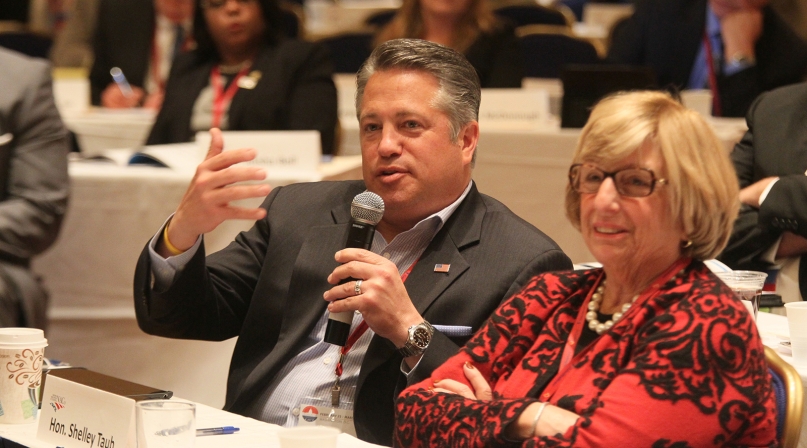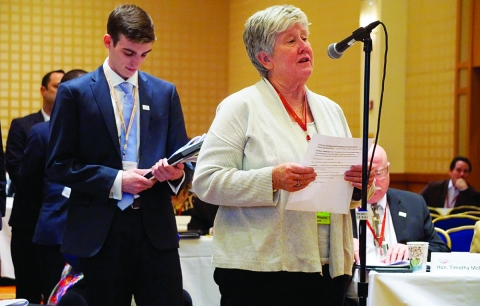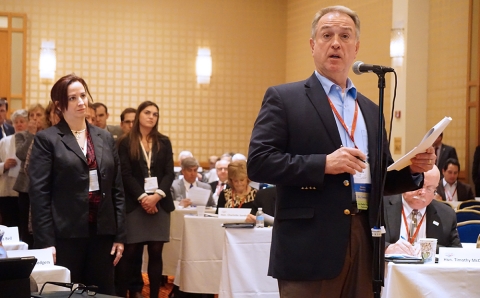Board adopts new policy on issues ranging from affordable housing to foreign sand
Upcoming Events
Related News

NACo Board adopts interim resolutions at Legislative Conference, spanning all issue areas
NACo’s Board of Directors adopted the following resolutions as interim policy at their 2017 Legislative Conference meeting. They will be considered for final adoption by the membership as a whole at the Annual Business Meeting, July 24 in Franklin County (Columbus), Ohio.
AGRICULTURE AND RURAL AFFAIRS
Preserve Rural Development Programs in the Farm Bill
Issue: Support for program structure and funding for programs under the U.S. Department of Agriculture’s Rural Development.
Adopted Policy: The National Association of Counties urges Congress to find opportunities to streamline the grant and loan application process while preserving the program structure and funding authorizations for individual Rural Development Programs under the U.S. Department of Agriculture.
COMMUNITY, ECONOMIC AND WORKFORCE DEVELOPMENT
FY 2018 Appropriations for the U.S. Department of Housing and Urban Development
Issue: Support FY 2018 appropriations for the U.S. Department of Housing and Urban Development (HUD).
Adopted Policy: The National Association of Counties urges Congress to support the following levels of funding for core U.S. Department of Housing and Urban Development (HUD) programs in the FY 2018 Transportation, Housing and Urban Development and Related Agencies Appropriations bill: no less than $3.3 billion in Community Development Block Grant (CDBG) formula funding; no less than $1.2 billion in formula funding for the HOME Investment Partnerships Program (HOME); $2.6 billion for Homeless Housing Assistance grants, including at least $270 million for the Emergency Solutions Grant program plus an amount to fully fund expiring supportive housing and Shelter Plus Care rent subsidy contracts; full funding for existing Section 8 project-based and tenant-based contracts and $500 million in Section 108 Loan Guarantee authority.
Affordable Housing
Issue: Support an increase in the supply of affordable housing through the expansion of tools such as the Low-Income Housing Tax Credit program.
Adopted Policy: The National Association of Counties urges Congress to increase the allocation of Low-Income Housing Tax Credits (LIHTCs) by 50 percent and enact a permanent 4 percent credit rate floor for acquisition and bond-financed projects, allowing the program to create and preserve more affordable homes in the United States. Additionally, Congress is urged to provide enhancements and increased funding levels to all programs aimed at increasing the supply of affordable housing.
Amend the U.S. Department of Housing and Urban Development (HUD) Emergency Solutions Grant (ESG) Legislation
Issue: Current U.S. Department of Housing and Urban Development (HUD) Emergency Solutions Grant (ESG) regulations require metropolitan city allocations of ESG funds to revert to the state when they fall under a certain threshold, thus preventing local communities from implementing programs to prevent and end homelessness.
Adopted Policy: The National Association of Counties supports an amendment to the current law to allow metropolitan city ESG funds that fall below the threshold to be remitted to the urban county in which the municipality is located, rather than the state. Additionally, NACo supports legislation that allows Metropolitan Cities and Urban Counties to form consortia for purposes of receiving and administering ESG funds.
Support Reauthorization and Appropriations for the Department of Commerce’s Economic Development Administration
Issue: Appropriations and reauthorization legislation for the U.S. Department of Commerce’s Economic Development Administration (EDA).
Adopted Policy: The National Association of Counties urges Congress to support reauthorization and appropriations for the U.S. Department of Commerce’s EDA to keep communities strong and economically viable at a time when our nation needs it the most.

ENVIRONMENT, ENERGY AND LAND USE
Support Liquid Natural Gas Export Facilities Nationally
Issue: Increasing liquid natural gas (LNG) infrastructure nationally.
Adopted Policy: The National Association of Counties supports development of liquid natural gas infrastructure and export facilities.
Support Codification of EPA’s Integrated Planning Framework and Related Demonstration Projects
Issue: Clean Water Act (CWA) compliance for sewer districts across the country is too costly.
Adopted Policy: The National Association of Counties urges the passage of legislation that codifies the U.S. Environmental Protection Agency’s (EPA) 2012 Integrated Municipal Stormwater and Wastewater Planning Approach Framework (Integrated Planning Framework), under which sewer districts can seek more efficient and affordable solutions to CWA compliance, and creates demonstration projects under which local communities will be allowed more flexibility in their efforts to comply with the regulatory requirements of the CWA.
Support Affordable Beach Renourishment Projects
Issue: Allowing local governments to purchase sand from countries outside of the U.S. to replenish shorelines due to beach erosion.
Adopted Policy: The National Association of Counties supports enabling the Secretary of the Army Corps of Engineers to allow counties to acquire sand by purchase, exchange or otherwise from non-domestic sources for the purpose of beach renourishment.
FINANCE, PENSIONS AND INTERGOVERNMENTAL AFFAIRS
Support the Reauthorization of the Volunteer Responder Incentive Protection Act
Issue: Tax protections of incentives for volunteer firefighters and emergency medical services (EMS) personnel expired in 2010 and must be reauthorized.
Adopted Policy: The National Association of Counties urges Congress to reauthorize the Volunteer Responder Incentive Protection Act (VRIPA), which would waive federal income taxes on nominal recruitment and retention incentives provided by local jurisdictions to volunteer firefighters and EMS personnel.
Support the U.S. Election Assistance Commission
Issue: H.R. 634 has been proposed to terminate the U.S. Election Assistance Commission, which provides assistance to state and local jurisdictions with the administration of federal election laws and programs. The legislation would transfer certain functions of the Election Assistance Commission (EAC) to the Federal Election Commission (FEC).
Adopted Policy: NACo opposes the termination of the U.S. Election Assistance Commission. NACo recognizes the importance of rigorous testing of voting equipment and appreciates the efficiencies and cost savings of voluntary federal certification. NACo appreciates the important role that the EAC plays in coordinating collaborative efforts among local, state and federal government officials in addressing issues from the accessibility of polling places to the cybersecurity of voting equipment and voter registration databases.
NACo urges the Department of Homeland Security, in light of its recent designation of election systems as critical infrastructure, to work in partnership with the EAC and its trusted and supportive relationships with election officials rather than creating new and duplicative programs to impose federal policy.

HEALTH
The Importance of the ACA and Medicaid Expansion
Issue: Covering over 70 million individuals, Medicaid is the country’s largest program providing health coverage and health care services to the nation’s low-income population. The Affordable Care Act (ACA) allowed states to expand their Medicaid programs, which provide billions of federal dollars to counties for indigent health care services, behavioral health services, preventative care, public health and coordinated care.
Adopted Policy: The National Association of Counties supports maintaining the Medicaid program as a means tested entitlement and further supports provisions in current law that allow for expanded program eligibility and coverage standards. NACo urges Congress and the administration not to repeal the Medicaid expansion. Maintaining the current eligibility and coverage under the current program is a fundamental principle if Congress considers a concurrent, comprehensive and sustainable replacement bill.
HUMAN SERVICES AND EDUCATION
Urge Congress to Maintain County Child Welfare Flexibility and Funding
Issue: The 115th Congress may enact legislation changing federal financing of child welfare services. In January 2017, the Family First Prevention Services Act (FFPSA) (H.R. 253) was reintroduced. Identical to last year’s measure (H.R. 5456), the bill would deny Title IV-E foster care and adoption assistance eligibility to many children who are eligible under current federal and state laws, and effective in Fiscal Year (FY) 2020, provides new federal entitlement funding for optional foster care prevention services. It would also impose new federal requirements relating to congregate (group home) care that would reduce federal IV-E reimbursement and shift costs to states and counties. The FFPSA also assumes that federal IV-E waivers would expire on September 30, 2019. Waivers give counties and states flexibility to test innovative approaches to child welfare service delivery and financing. Under waivers, states design and demonstrate a wide range of approaches to reforming child welfare and improving outcomes in the areas of safety, permanency and well-being. Finally, Congress is also considering entitlement reform, including block granting health and human services programs such as Title IV-E foster care, which would shift costs to states and counties.
Adopted Policy: The National Association of Counties urges Congress to amend the Family First Prevention Services Act so that it would not shift increased costs to states and counties by denying Title IV-E eligibility to children who would remain eligible for state or county-funded foster care and adoption assistance. In doing so, Congress should also provide states and counties with sufficient flexibility to serve and protect abused and neglected children as done currently under some state laws.
NACo further urges that the bill’s proscriptive provisions intended to reduce the use of congregate care be amended so that states and counties already proceeding with similar efforts may continue to do so.
Additionally, Congress should extend federal IV-E waiver authority through September 30, 2024 unless comprehensive child welfare finance reform that reflects NACo’s priorities is passed and implemented before that time. Finally, NACo opposes any congressional effort to block grant IV-E foster care financing.
Support Two-Generation Efforts to Reduce Poverty
Issue: Poverty is a national problem and requires a national solution. In order to combat the harmful impacts of intergenerational poverty, federal, state and local partners should promote new methods of addressing these issues.
Adopted Policy: The National Association of Counties encourages the federal government to pursue policies that support and enable state and local jurisdictions to coordinate a two-generation approach to combat poverty. Federal efforts to reform public assistance must recognize that poverty is influenced by national economic factors that are not within the control of local or state governments, and that local and state governments are best positioned to help their citizens when federal programs are flexible and support all generations within a family.
Stop Sexual Abuse in Families
Issue: Sexual Abuse in Families
Adopted Policy: The National Association of Counties strongly supports starting the dialog and pursuing types of education to assist counties, states and the federal government in helping prevent child sexual abuse (CSA) in families.

Clarify and Expand NACo Policy on the Supplemental Nutrition Assistance Program (SNAP)
Issue: The Supplemental Nutrition Assistance Program (SNAP) is critical to struggling families and has proven to be one of the most countercyclical federal programs because benefits can reach families quickly during economic downturns as well as natural disasters. Counties should be considered an integral partner as Congress begins reauthorization of SNAP.
Adopted Policy: NACo supports moving a SNAP reauthorization in conjunction with a reauthorization of the Farm Bill.
NACo supports the current SNAP entitlement program and funding structure, including maintaining the 50 percent federal administrative match for states, given that counties contribute to the administrative costs of the SNAP program in many county-administered states. SNAP should not be block granted, since such a policy change would place additional strain on both recipients and state and local governments. As the introductory statement says, SNAP is indeed a very responsive countercyclical program, as evidenced by the large increases in SNAP participants during the great recession in the late 2000’s and early 2010’s. Block granting would seriously undermine that responsiveness, leaving struggling families with less access to food and further weakening the economy since SNAP families redeem their benefits quickly and locally. Moreover, counties would see shifts in costs to support those households if the already low benefit is reduced under a block grant.
NACo encourages Congress to increase the options available to state and local administrative bodies in streamlining applications and administrative processes. Local social services departments see many individuals and families that are eligible for multiple programs, but requirements are often slightly different for each program, generating significant work for staff and applicants alike. All states should be allowed to seamlessly enroll Supplemental Security Income (SSI) participants in the SNAP program. In general, as additional programs are streamlined, barriers to entry for participants should be reduced, and Congress and states should not make the most restrictive elements of each program the qualifications required for approval.
Congress and the U.S. Department of Agriculture Food and Nutrition Service (FNS) should work to reduce “churn” — the rolling of recipients on and off of the program — in the SNAP program, which can be a burden for recipients and administrators alike. Administration and application processes should be simplified to allow individuals reapplying for benefits to enter a streamlined process, reducing the time between application and receiving benefits while also reducing administrative costs.
Proper nutrition is crucial to high-quality early childhood development goals and ensures children are mentally and physically prepared to learn when entering school. SNAP benefits for families should be at an adequate level so that all children have healthy diets.
NACo opposes arbitrary and counterproductive work and participation requirements and supports a strong county role in mutually negotiated outcome measures in which states are judged by their progress toward achieving agreed upon goals. NACo supports greater flexibility in the SNAP work requirements in order to allow counties and states to meet the individual needs of their caseloads.
NACo supports enabling individuals to find and secure long-term employment and encourages Congress to acknowledge the reality that for time-limited assistance to be successful, it must be accompanied by adequate federal and state funding for a wide range of supportive services. The SNAP Employment and Training (SNAP E&T) program should receive more realistic funding levels from the federal government to ensure states and counties have the proper resources to assist individuals in finding work and remaining employed, including increasing the reimbursement rate, since SNAP E&T is an employment program. SNAP E&T should also be further integrated with existing workforce programs at the federal, state and local level, including local workforce development boards.
In addition to the increased reimbursement rates for employment programs, NACo supports lengthening the time limit for Able Bodied Adults Without Dependents (ABAWD) and making the work requirements more flexible. Often, rapid attachment employment programs are short term, and individuals who find work do not remain employed because they have not developed the required skills. Allowing for increased training and an extended time limit would make employment goals more realistic. Additionally, NACo supports a tax incentive for employers who hire ABAWD SNAP participants for 20 hours or more each month, which could be increased based on the number of ABAWD participants hired. NACo also supports allowing counties in county-administered states to apply for a waiver for the ABAWD time limits if the state does not apply for a state-wide or partial waiver.
Lifetime disqualification from the SNAP program can have a lasting effect not just on the individual, but also on his or her family. NACo supports additional flexibility in disqualification determinations for states and local governments. NACo also supports lifting the lifetime ban on individuals with felony drug convictions in all states.
Recipients of federal benefits programs often face a financial “cliff” as they gain employment — the boundary line at which point individuals or families lose benefits given their rise in income. NACo urges Congress to consider gradual phase outs of certain programs, including SNAP, to ease the transition from benefits to income, especially for families.
NACo urges Congress and the FNS to pursue solutions that address the specific obstacles rural communities face in ensuring access to food and healthy eating habits in rural areas, which often lack access to healthy food options. States with large rural populations and rural counties should be afforded additional flexibility in the administration of the SNAP program to help combat these challenges.
Among federal benefits programs, SNAP is already a leader in innovation and simplification of benefits, including the use of SNAP Electronic Benefits Transfer (EBT) cards. The federal government should continue to play a leading role in developing technology that makes program administration more seamless. By pioneering advances at the federal level, the program would be streamlined in states and local jurisdictions across the country.
NACo supports the goals of maintaining low levels of fraud and error rates within the SNAP program. Counties believe that a federal commitment to streamlining the program, increased technological advances and additional flexibility to eliminate systemic program issues (including program churn) will help achieve this goal.

JUSTICE & PUBLIC SAFETY
Improve Pretrial Justice Process
Issue: Confinement of county and regional pretrial detainees who do not present an unmanageable risk of failure to appear or a threat to public safety, but do lack the financial means to secure release.
Adopted Policy: The National Association of Counties urges the Department of Justice to continue efforts to advise state, county and municipal courts to acknowledge that the principles of due process and equal protection require that courts not employ bail and bond practices that cause indigent defendants to remain incarcerated even for a few days solely because they cannot afford to pay for their release.
Support the Reauthorization of the Assistance to Firefighters Grant Program, Including the Safer Grant Program
Issue: Department of Homeland Security grant programs that support local fire departments.
Adopted Policy: The National Association of Counties urges Congress to reauthorize the Department of Homeland Security’s Assistance to Firefighters Grant program, including the SAFER grant program, so that local fire departments can continue to receive federal support for their efforts to provide all-hazards response to their communities.
PUBLIC LANDS
Support Bureau of Land Management Foundation Act or Successor Legislation
Issue: The Bureau of Land Management has limited congressionally appropriated resources, hindering its ability to fulfill its mission, which in turn may negatively impact public lands counties across the nation in several ways.
Adopted Policy: The National Association of Counties supports a Bureau of Land Management Foundation Act successor bill in the 115th Congress establishing a foundation which can help support the activities of BLM.
Repair and Maintain the Public Land Survey System
Issue: The Public Land Survey System (PLSS) is in a varying degree of deterioration nationwide due to the lack of resources provided to counties.
Adopted Policy: The National Association of Counties urges Congress to provide additional funding to counties to support the existing Public Land Survey System. NACo further urges the federal government to enforce existing guidelines and rules for the PLSS.
Support the Outdoor Recreation Act
Issue: Outdoor recreation on public lands is a key economic driver for public lands gateway communities. Recently enacted federal legislation (the Outdoor Recreation Jobs and Economic Impact Act of 2016) calls for measuring the economic impacts of outdoor recreation as part of the United States Gross Domestic Product. Once the federal government fully understands the economic impacts of outdoor recreation, land management agencies and local governments, along with proponents of public lands conservation and stewardship, multiple use, restoration and access, will have necessary data to measure the impact of the recreation economy and the key role that sustainable recreation needs to play in the management decisions of public lands agencies.
Adopted Policy: The National Association of Counties supports the enacted Outdoor Recreation Jobs and Economic Impact Act of 2016 and the effort to measure the outdoor recreation economy’s contribution to the U.S. economy. NACo recommends that federal land management agencies, including the U.S. Forest Service, U.S. Bureau of Land Management and National Park Service, work with the U.S. Bureau of Economic Analysis to record the economic impact of outdoor recreation on public lands, and that these agencies invest in the maintenance of recreation infrastructure on which the outdoor recreation industry relies.
Secure Rural Schools; Approval of Members for Resource Advisory Committee
Issue: The amount of time it takes to approve citizens as members of Resource Advisory Committees under the Secure Rural Schools Act results prevents projects from getting accomplished in a timely manner, frustration of people who have volunteered to participate, and a potential for loss of funding that goes unobligated. NACo’s 2017 Resolution should encourage alternative and innovative approaches that are not limited to the explicit proposals offered.
Adopted Policy: In 2016, NACo urged Congress to amend the Secure Rural Schools and Community Self Determination Act to exempt Resource Advisory Committees from adherence to the Federal Advisory Committee Act, and to allow the Chief of the Forest Service to delegate appointment of citizens to Resource Advisory Committees to the appropriate Regional Forester, or Forest Supervisor. Additionally, NACO should advocate for other innovative solutions, such as thresholds on populations or budget amounts, exemptions for certain entities or quorum requirements in certain circumstances, a reduction in the size of RACs, and extension of the terms, or some combination to permanently address the inability of some RACs to meet due to lack of a quorum.

TELECOMMUNICATIONS AND TECHNOLOGY
Clarify that NACo’s Telecommunications and Technology Policies and Practices Apply to “Small Cell” and “DAS” Technologies and to Oppose Efforts to Preempt County Rights at the Federal or State Level
Issue: The National Association of Counties must clarify that its Telecommunications and Technology policies and practices apply to new small cell technologies or shared wireless infrastructure technologies such as distributed antennae systems (DAS), as there are proceedings at the FCC, legislation being considered in Congress and legislative and regulatory actions at the state level that seek to preempt local authority over the siting of small cell and DAS technologies.
Adopted Policy: The American County Platform and Resolutions, specifically those subsections listed below, shall be read to apply to all wireless technologies regardless of their size and where within a county those technologies are deployed, including rights-of-way.
NACo has developed powerful and effective policy positions in the Telecommunications and Technology area as reflected in the NACo American County Platform and Resolutions 2016-17, specifically the Telecommunications and Technology policies and practices outlined in:
- Subsection A (Encouraging Competition and Development of New Technologies),
- Subsection B (Opposing Preemption of Local Authority), and
- Subsection E (Preserving the County Role in Wireless Communications Facilities Siting)
There are numerous proceedings at the FCC, legislation being considered in Congress and legislative and regulatory actions at the state level that seek to preempt local authority over the siting of small cell and DAS technologies and drastically reduce, if not eliminate, the rent, in-kind benefits and public private partnerships that counties may now charge for the use of public assets such as rights of way and above ground infrastructure. NACo’s voice is needed now more than ever in calling on the FCC and Congress to make data driven decisions that respect local rights and preserve local choice.
County governments have long supported and will continue to work with industry and other stakeholders to support the deployment of next generation wireline and wireless networks and the smart technologies they make possible and the meaningful role they may play in addressing challenges such as: congested transportation, air quality, environmental sustainability, enhanced public safety communications and Internet of Things connectivity.
TRANSPORTATION
Fully Fund Federally Mandated Local Airport Security
Issue: Pursuant to 49 U.S.C. § 44903(c) and 49 C.F.R. Part 1542, airport operators are required to establish an air transportation security program that provides a law enforcement presence and capability at the airport that is adequate to ensure the safety of commercial airports. This program is part of the cooperative effort between Transportation Security Administration (TSA) and airports to support deployment of sufficient law enforcement officers by airports to ensure passenger safety and counter risks to transportation security. Local Airport Authorities are receiving insufficient funding from the TSA to cover the cost of locally employed law enforcement officers for airport security.
Adopted Policy: Increase the federal funding allocated for the Transportation Security Administration Law Enforcement Reimbursement Program so that the maximum reimbursement rate may be increased to cover the local airport’s actual cost of (non-TSA) law enforcement officers employed by the local airport to fulfill federally mandated airport security requirements.
Support Direct Funding to Local Governments for the Improvement and Maintenance of Local Roads in America within the Proposed Infrastructure Spending Bill
Issue: Include direct funding for roads infrastructure by local governments to address America’s rapidly deteriorating transportation network and create jobs.
Adopted Policy: The National Association of Counties urges the president and Congress, through the proposed infrastructure spending bill, to create dedicated funding allocated directly to local governments for the improvement and maintenance of local infrastructure in America.
Support Federal Pilot Program for the Remote Air Traffic Control Tower Program
Issue: The growth in domestic and international commercial flights, at a time when federal funding for aviation related programs has seen only slight incremental growth, has put a strain on high-cost local airport facility investments such as air traffic control towers and related equipment.
Adopted Policy: The National Association of Counties urges Congress to establish in the next Federal Aviation Administration (FAA) reauthorization or extension of the current FAA authorization law, a pilot program within the U.S. Department of Transportation (DOT) FAA that, in consultation with airline operators and general aviation users, oversees the installation and operation of remote air traffic control towers.
Continue Funding of Essential Air Service and the Small Community Air Service Development Program
Issue: Many communities in areas that lack access to large or medium-sized aviation hubs rely on smaller airports that receive funding through both the Federal Aviation Administration’s (FAA) Small Community Air Service Development Program (SCASDP), which provides dollars to address air service and airfare issues, and the Essential Air Service (EAS) Program, which is a program that regularly finds itself under consideration by Congress for significant funding cuts or elimination.
Adopted Policy: The National Association of Counties urges Congress to continue to fully fund the Essential Air Service (EAS) program that provides dollars to airlines that serve small communities.
NACo also urges Congress to continue guaranteed funding of the Small Community Air Service Development Program (SCASDP) that helps small communities address air service and airfare issues.
Support a Federal Infrastructure Package wth Robust Dedicated Funding, Innovative Incentives for Private Investment and Promotion of County-Friendly Financing Tools such as Tax-Exempt Municipal Bonds
Issue: Critical infrastructure in the United States has fallen into a perpetual state of disrepair. The funding and financing solutions have failed to ensure that our nation’s roads, bridges, ports, airports, mass transit and rail systems, transportation alternatives and water infrastructure are able to keep pace with the demands of a growing population and technological advances.
Adopted Policy: The National Association of Counties urges the president and Congress to support a long-term infrastructure package to capitalize sustainable, dedicated funding sources (Highway Trust Fund, Airport and Airway Trust Fund, Harbor Maintenance Trust Fund, etc.), promote an environment for public-private partnerships where appropriate and to promote the preservation of tax-free status for municipal bonds, among other instruments, to ensure America’s infrastructure keeps pace with the needs of a growing economy and nation.
Attachments
Related News

Start preparing for NACo Annual Business Meeting
To be eligible to vote at the 2024 Annual Business Meeting, NACo members must register for the Annual Conference, pay 2024 NACo membership dues in full and designate one voting delegate by 5 p.m. EDT July 8.

Podcast: ForwardTogether during National County Government Month
NACo President Mary Jo McGuire spoke to the County News Podcast about National County Government Month seen through the prism of her presidential theme: ForwardTogether — connect, inspire and lead.

Application for 2024–2025 Presidential Leadership and Committee Appointments
While you serve your county in vast ways, I ask you to strongly consider submitting your name for a leadership position at NACo. Together, we can achieve results for our counties and the people we serve each and every day.